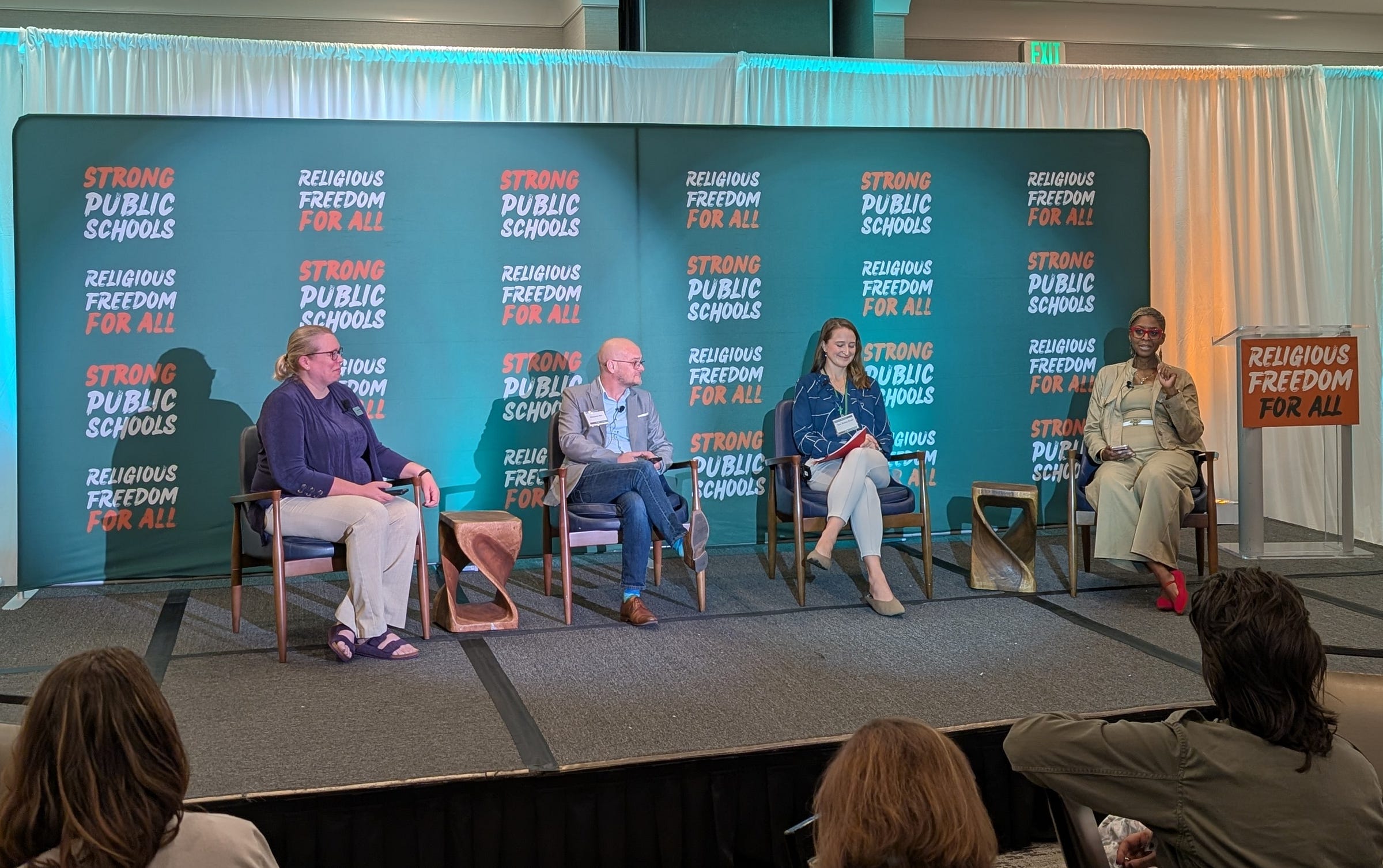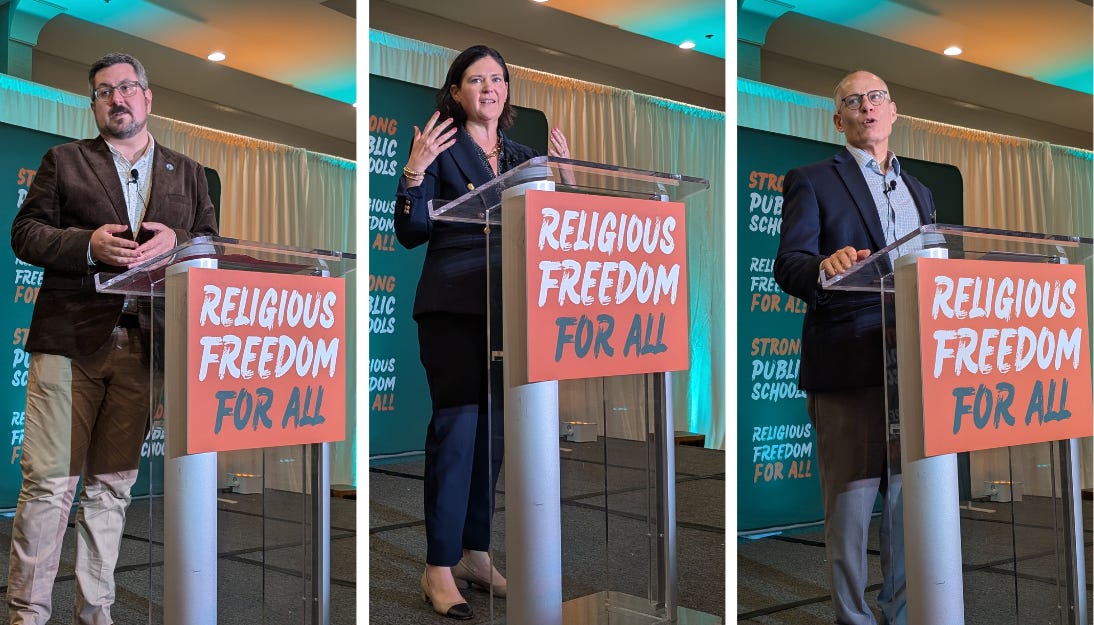Summit Challenges Christian Nationalist Attacks on Public Schools
On Monday (Sept. 15), the Oklahoma Supreme Court blocked controversial new K-12 social studies standards that Superintendent of Public Instruction Ryan Walters had pushed to promote Christianity in public schools. A couple of hours later, advocates for public education and church-state separation cheered the ruling during a pre-planned summit in Dallas, Texas. Lead plaintiff in the case, Baptist minister Mitch Randall, was at the summit. Also present were leaders from Americans United for Separation of Church and State (where I serve on the national board), which worked with the Oklahoma Appleseed Center for Law & Justice to represent the local plaintiffs.
Other recent legal wins also sparked applause and hope during the two-day Religious Freedom in Public Schools Summit led by Interfaith Alliance and cosponsored by numerous organizations, including Americans United, Baptist Joint Committee for Religious Liberty, Cooperative Baptist Fellowship, Freedom From Religion Foundation, Hindus for Human Rights, Muslim Public Affairs Council, National Council of Jewish Women, Pastors for Children, Texas Impact, and others. As more than 150 advocates, educators, and clergy members from 22 states gathered, they celebrated recent court rulings in Louisiana, Arkansas, and Texas blocking laws forcing public schools to post a highly edited version of the Ten Commandments as well as another win in Oklahoma blocking the creation of a sectarian public school. Rabbi Mara Nathan, the lead plaintiff in the Texas case, was there.
“Everyone should have their own opportunity to raise their own children in the way they want to and choose to raise them in their own houses of worship or not,” said Nathan, who added that people deciding to “stand up” for such religious liberty rights inspires others who hear “people taking the chance to say that out loud.”
Her call to take the risk and stand up against Christian Nationalist attacks on public education captured the spirit of the gathering. Despite the legal wins, the summit mostly focused on the challenges across the nation as those pushing Christian Nationalism target public education. And the group gathered in what is often ground zero. Christian Nationalistic efforts like pushing “chaplains” and highly edited versions of the Ten Commandments in schools started in Texas before being copied by lawmakers in other states. And Texas politicians are also undermining public education through the promotion of vouchers to private schools and by encouraging government prayer in public schools.

“Texas is a testing ground. The strategies developed here often spread nationwide. So that’s why it is critical to understand not only what's happening in Texas but how Texans are organizing to resist,” declared Rev. Alyssa Aldape, a native Texan who serves as faith organizer and programs manager at Americans United. “Texas is a state of fighters and that there are good folks in this state fighting for our public schools.”
That call to stand up for public education guided the summit as speakers considered ways that Christian Nationalism is threatening religious liberty rights in public schools and how to push back in courtrooms, state capitols, school board rooms, and houses of worship. So this issue of A Public Witness takes you to the heart of Texas to consider the promise of public education and church-state separation.
Counter-Organizing
Multiple speakers noted that public education is under threat across the nation because Christian Nationalist groups are mobilizing to get copycat legislation introduced in more states and to push lawmakers to adopt various proposals.
Mark Chancey, a religious studies professor at Southern Methodist University, has studied coverage of religious topics in public school curriculum. At the summit, he talked about how several legislative ideas — including the highly edited Ten Commandments, social studies courses on the Bible, and offsite religious instruction for school credit — sprung up and have now been introduced in numerous states. Chancey also talked about curriculum efforts in Texas and Oklahoma to put more Christianity into social studies and other classes. He mentioned that the adopted materials in Texas not only are “religious biased” but “also have actual errors in them.” A lesson on Esther talks about her faith in God even though God isn’t mentioned in the book, to which Chancey quipped, “They took a Bible story and decided they needed to make it more religious.”
Yet, that curriculum in Texas is actually better than the original proposal thanks to the advocacy work of some of the organizations at the summit. Amanda Tyler, a Texan who serves as executive director of Baptist Joint Committee for Religious Liberty, presented on the successful efforts to mobilize people to testify and submit responses against the proposed curriculum. She praised the work of journalists for raising attention to the issue and to advocacy groups for out-organizing Christian Nationalist groups so that the submitted public comments against the curriculum outnumbered the supportive comments 10-1 and they outnumbered the in-person witnesses testifying in the Capitol 3-1. And while a version of the curriculum still narrowly passed, Tyler emphasized what they accomplished in addition to getting some good edits to the curriculum.
“Even though this curriculum passed, this was a win for local organizing because we built relationships, we trained people on how to show up and to file comments, and we made it bipartisan in the opposition to this particular curriculum,” she said. “Particularly when we have so many headwinds coming at us, we have to think about the ways that we are building a long-term movement to sustain the work over time.”
Tyler added that the coalition followed up by meeting with school administrators to share concerns in hopes of encouraging them not to utilize the new curriculum. And many school districts have decided not to use it.

Similar advocacy highlighted at the summit was the effort against legislation for schools to hire a spiritual “chaplain,” though the bills passed in Texas, Louisiana, Florida, and Missouri do not have standards to ensure those chosen are actually chaplains (and also do not prohibit proselytization or require parental consent). A panel of actual chaplains explained the problems with the push for school “chaplains.” And they talked about the advocacy effort against the legislation in Texas and elsewhere as chaplains signed a public statement opposing the bill and went to school board meetings to encourage them not to create such a position.
These bills are not popping up organically, but instead are the result of organizing by Christian Nationalist groups. Oklahoma state Rep. Mickey Dollens, a former public school teacher who also serves as the regional government affairs manager for the Freedom From Religion Foundation, shared about his experience attending a meeting of the National School Chaplain Association, the Christian Nationalist group behind the “chaplains” bills and that says they are doing this to bring prayer “back in school.”
“These bills are getting sent all over the country through a network that promotes their important legislation to lawmakers,” Dollens said after highlighting false claims from the NSCA that lawmakers repeat in legislative debates. “Every family, religious or not, should be able to send their kids to school without fear of indoctrination disguised as counseling. Now is the time. Elected officials must invest in real mental health, not shortcuts fueled by fear-mongering, profit motives, and religious ideology.”
“Focus on local and state politics. You can make a true difference because that’s where this wave of theocratic legislation is taking place, directly in the states,” he added.
‘A Stress Test’
Recognizing the importance of religious liberty in public schools and the dangers of Christian Nationalism, speakers at the summit also emphasized how church-state separation protects public education.
Maggie Siddiqi, a senior fellow at Interfaith Alliance and a former director of the Center for Faith-Based and Neighborhood Partnerships at the U.S. Department of Education, argued that students need schools to follow both clauses of the First Amendment. Rather than viewing the Establishment Clause and the Free Exercise Clause as in conflict with each other, Siddiqi insisted they are instead “so reliant on each other because what does free exercise look like if the government is telling you what your religion should be?”
“[Religious freedom] is ensuring that all students are free to learn as their full self — including their religious and non-religious identities — so they’re able to bring that into the classroom without fear of repercussion and without infringing upon another’s right to do the same,” she added. “Religious freedom for all is best protected through public education. … When we uplift public education itself, we uplift religious freedom.”
Similarly, Alessandro Terenzoni, vice president of public policy at Americans United, argued, “Religious freedom ensures that students and their families — not politicians or public school officials — get to decide whether or how to engage with religion. No students should ever be made to feel excluded, whether it’s in a classroom or a locker room, because they don’t share the religious beliefs of their teachers, their school officials, their coaches, or even other students. And no parent should have to worry that their child is receiving religious instruction in a public school.”
Rabbi Sharon Kleinbaum, who previously led a synagogue in New York City and now serves as director of The Beacon project at Union Theological Seminary, similarly noted the importance of church-state separation to protect public education as well as the broader American experiment.
“For us as Jews as one of the minority religions in America, the separation of church and state has been at the center of the strength of the Jewish experience in America,” she said. “Before the Constitution was passed in the late 1700s in this country, there had never been an experience of Jews in any country in which we were considered first-class citizens where we were the minority religion. It was the first time in human history, and that was founded on that First Amendment in which there was a separation, the two clauses. … That gave Judaism a sense of safety here in America that we as Jews have never experienced before in human history. It’s not been perfect. There’s been a lot of social discrimination, etc, etc, but the vision of the Constitution is that incredible protection of minority religions. That is such a profoundly radical thing.”
“Any attempt — and we see them now, the drumbeat of the attempt to destroy that wall [separating church and state] hurts religion first and foremost,” she added. “The idea that the elimination of the separation of church and state will benefit religion is an illusion that we understand, and nowhere more is that visible than in the public school system and our profound institution of creating a space for the education of all children — no matter who they are, no matter what their backgrounds are.”

And so the ballroom full of advocates for church-state separation and public education discussed ways to continue defending both. As Dahlia Taha of the Muslim Public Affairs Council argued, public education is perhaps the best test of whether our nation is adhering to the principle of church-state separation.
“Religious liberty is supposed to be America’s first liberty. But really, it’s a stress test, and nowhere is this test clearer than in our public schools,” she explained. “Public schools are arms of the state. When they deny religious recommendations, silence students, or trivialize harassment, they aren’t just failing young people. They’re failing the First Amendment.”
“Once one group’s rights are dismissed, every group becomes vulnerable. Every time a school shrugs it off, the lesson that students absorb is clear: your rights depend on whether they inconvenience others,” she added. “If the First Amendment is conditional for our Muslim students, it is conditional for all children. … Religious freedom only works if it works for everyone everywhere all the time.”
As a public witness,
Brian Kaylor



Thank you, again, Brian, for keeping these important issues before us!